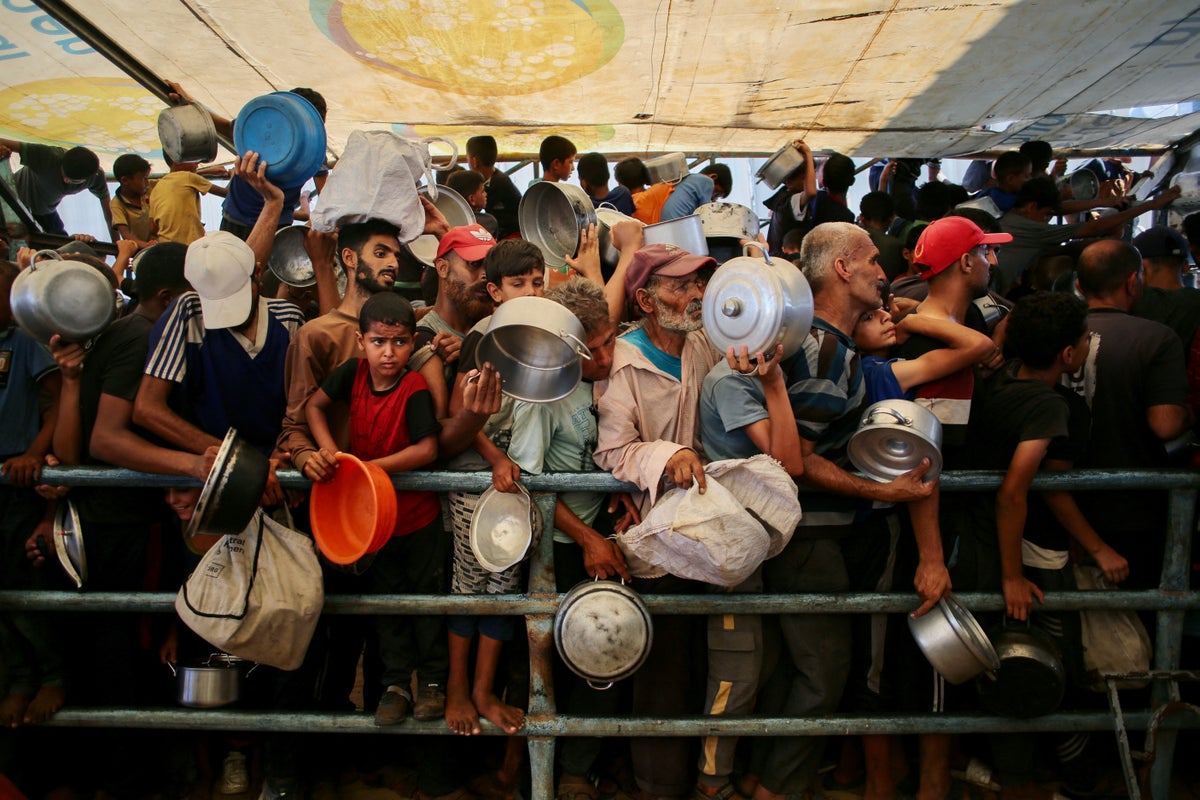The images coming out of Gaza of emaciated, dying children are, as the foreign secretary David Lammy says, appalling and sickening. They cannot be dismissed as propaganda, and even the Israeli authorities have not sought to do so. They are, in human terms and by any standard, atrocities – just as surely as those inflicted on innocent people by Hamas terrorists on 7 October 2023 were also atrocities.
This latest wave of human suffering should evoke yet more anguish among all civilised peoples. It is time, as Mr Lammy and his colleagues from 27 other nations plead in an open letter, for the war in Gaza to end.
Realistically, it will not – at least not immediately. The Israeli government, with unconscious irony, dismisses the calls for an end to the fighting as “disconnected from reality” and “sending the wrong message to Hamas”. As opposed, critics might wonder, to the “message” the Netanyahu government is currently sending to Hamas, which is that peace will never come, the IDF is set on the literal destruction of Gaza as a place of human habitation, and that they, Hamas, as terrorists, therefore have nothing to lose, whether they release the remaining hostages or not (and which they should do, in any case, without delay).
So there is no change yet in Israeli policy. It has even opened up a new front by intervening in Syria, unleashing more agonies, as The Independent’s Bel Trew reports. The Israeli Defence Force is engaged in another major military offensive, this time in central Gaza, and the shelling goes on. Tens of thousands of people have been told, yet again, to move to safety, when there is no sanctuary anywhere, not least because of the terrible shortages of the means of life – clean water, food, shelter.
There are credible reports that Israeli forces are systematically destroying what few structures remain standing across Gaza. In planned demolitions, to already damaged buildings and ones that appear largely intact, former homes, schools and other civilian infrastructure are being blown up. The plan to crush millions of people into a cynically labelled “humanitarian city”, which will be anything but safe, is still in place.
The equally misnomered Gaza Humanitarian Foundation (GHF), backed by Israel and the United States, is failing to deliver aid; instead, people are dying in the ensuing chaos. One witness, the British doctor Nick Maynard, says people at aid sites are being used as target practice (a claim rejected by the IDF). Philippe Lazzarini, commissioner general with the UN Palestine aid agency, calls the sites a “sadistic death trap”.
There was a time when combatants in any war would not target United Nations agency posts and personnel. Not in the case of the Israeli occupying forces in Gaza, where the World Health Organisation’s staff residence, main warehouse and health hub were attacked. The WHO reports that “Israeli military forces entered the premises, forcing women and children to evacuate on foot toward al-Mawasi amid active conflict. Male staff and family members were handcuffed, stripped, interrogated on the spot, and screened at gunpoint.”
The suffering of the people of Gaza is on an apocalyptic scale, bombarded and besieged virtually without respite, and visited by conquest, war, famine and death.
It seems hopeless – but the last thing the Palestinian people need from the West is a counsel of despair. Mr Lammy has called out what Israel has been doing, taken some, as yet inadequate action, and come as close as he can to condemning Israel for war crimes: “Permanent forced displacement is a violation of international humanitarian law.”
Many would urge him to go further. Lord Sumption, a universally respected lawyer, has argued that “the conduct of Israel in Gaza is grossly disproportionate and there’s at least an arguable case that it’s genocidal”.
Mr Lammy and the other 27 foreign ministers have the option to echo that kind of language. He is urged to do so – but he is right to hold back, and, for the time being, await the International Court to come to a judgment.
Why? Because the only consideration about what to do next should be whether it will have any appreciable impact on what’s happening on the ground. Recognising a Palestinian state and setting up a British embassy in Ramallah wouldn’t save the life of single Palestinian baby. Nor would an outright charge of genocide. Not yet, at any rate.
What would matter is if the Americans can be persuaded to put pressure on Israel to end the war and the famine: after all, this is Donald Trump’s declared policy.
Loyal as he is to Benjamin Netanyahu, the Israeli leader has been testing President Trump’s patience in recent months. When Karoline Leavitt, the forthright White House spokesperson, reveals that the president has been “caught off guard” by recent Israeli bombings in Syria and of a church in Gaza, and called his friend Bibi to “rectify” the situation, it does at least show that action is possible.
In May, Mr Trump expressed concern about people starving, and perhaps, as with Vladimir Putin and the war in Ukraine, the president may slowly be coming to realise that Mr Netanyahu has also been playing him along; he might take decisive action that would stop the killings in a day.
But if Washington remains impassive, then once again a “coalition of the willing” must be formed to do whatever it takes to pressure Israel – diplomatic recognition of Palestine, a full arms embargo, trade sanctions and economic pressure. Especially if this is done in concert with Israel’s influential regional neighbours, such as Egypt, Turkey, Jordan, the UAE and Saudi Arabia.
Such a wide diplomatic coalition might convince Israel that it can be made more – not less – secure if it retains the support of the international community beyond the US, and it ends the war in Gaza – now.

